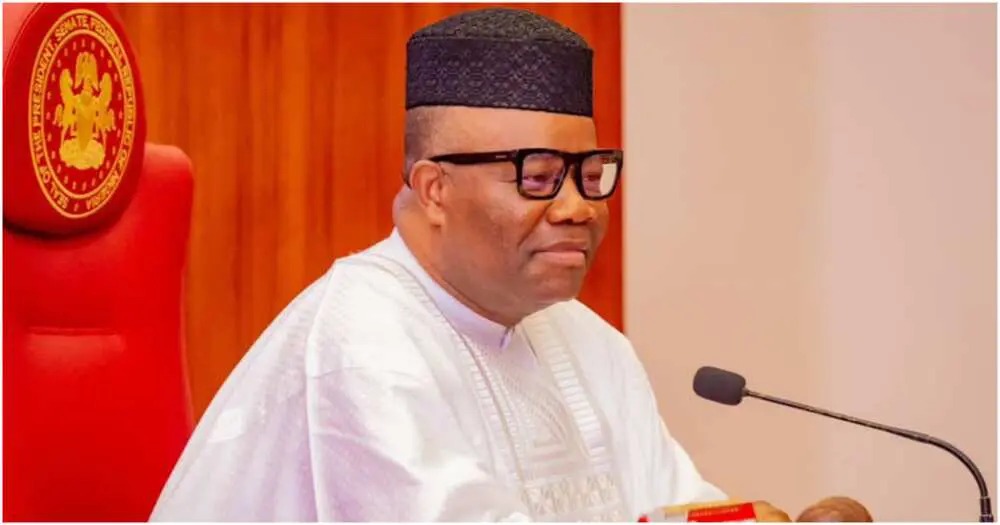“Nigerian Labor Unions Blast Akpabio Over ‘Tax Evaders’ Comments as Reforms Face Backlash”
 akpabioSenate President Godswill Akpabio is facing sharp criticism from the Nigeria Labour Congress (NLC), the Trade Union Congress (TUC), and the Nigeria Employers’ Consultative Association (NECA) following his comments about tax compliance in Nigeria. Akpabio recently stated that only 30% of Nigerians pay taxes, while calling for increased government revenue. His remarks were made during the opening of a two-day public hearing on controversial tax reform bills in Abuja, where he emphasized that tax reforms are essential for Nigeria’s future.
akpabioSenate President Godswill Akpabio is facing sharp criticism from the Nigeria Labour Congress (NLC), the Trade Union Congress (TUC), and the Nigeria Employers’ Consultative Association (NECA) following his comments about tax compliance in Nigeria. Akpabio recently stated that only 30% of Nigerians pay taxes, while calling for increased government revenue. His remarks were made during the opening of a two-day public hearing on controversial tax reform bills in Abuja, where he emphasized that tax reforms are essential for Nigeria’s future.
However, Akpabio’s statement sparked outrage from labor unions and economic stakeholders who argue that widespread tax evasion is a direct result of poor government accountability.
Reacting to Akpabio’s claims, NLC officials made it clear that Nigerians would only be willing to pay taxes if they could see tangible benefits from government spending.
“Citizens will only fulfill their civic duty of paying taxes when they can directly link their survival to the government’s positive actions,” an NLC spokesperson said. “A government that is unaccountable cannot be trusted with the people’s hard-earned resources.”
The labor union also criticized government officials for their lavish lifestyles, suggesting that they were living off the suffering of ordinary Nigerians. “You cannot tax poverty; you tax wealth,” the NLC added. “If the government fails to create an environment that encourages wealth creation, how can they expect Nigerians to feel confident in contributing their taxes?”
In a further statement, the NLC pointed out the disparity between the way the wealthy and low-income earners are treated. “The poor workers are the ones who pay their taxes faithfully every month, while the rich find ways to evade their responsibility. Now, the government is planning to place even more burden on the poor through new tax reforms.”
Dr. Tommy Okon, Deputy President of the TUC, also took issue with Akpabio’s claims, casting doubt on the accuracy of the statistics presented. “We have no idea where these figures are coming from, especially in a country where reliable data is scarce,” Okon said. “If the numbers are true, then why does the Federal Inland Revenue Service (FIRS) consistently exceed its revenue targets?”
Okon further criticized the government for imposing excessive tax burdens on ordinary Nigerians. “This administration has already taxed the people enough,” he argued. “It’s the wealthy who evade taxes, not the workers who pay directly from their salaries.”
Similarly, NECA voiced strong opposition to Akpabio’s remarks, highlighting the role of government accountability in promoting tax compliance. “While it is true that many Nigerians do not pay taxes, the government has given them numerous reasons to distrust the system,” said Adewale-Smatt Oyerinde, NECA’s Director-General. “If citizens don’t see the benefits of taxation, they will naturally resist paying it.”
NECA also emphasized the need for greater transparency and accountability in the management of tax revenues. “While we support the idea of tax reforms, it is crucial that there is a clear mechanism to ensure that the taxes collected are used effectively,” Oyerinde added.
Meanwhile, during the public hearing, Senator Sani Musa, Chairman of the Senate Finance Committee, revealed that President Bola Tinubu had urged lawmakers to ensure the proposed tax reforms lead to practical and effective laws.
“The President told me, ‘Go and do the needful. Give me a law that works,’” Musa shared, emphasizing that the goal of the reforms is to harmonize tax collection, improve distribution, and ensure fairer economic policies. He assured Nigerians that concerns about marginalization and revenue allocation would be addressed.
Akpabio, in his defense, stressed the need for modernizing Nigeria’s outdated tax laws to reflect current economic conditions. “Many of our tax laws date back to colonial times and need urgent revision,” Akpabio said. “Tax compliance should not be a burden. We need a tax system that is fair, transparent, and efficient.”
He also urged stakeholders to study the bills carefully and avoid making judgments based solely on social media debates. “Don’t base your arguments on opinions you see online. Read the bills, analyze them, and make informed recommendations.”
Despite strong opposition from labor unions, some organizations, including the Nigerian National Petroleum Company Limited (NNPCL), the Institute of Chartered Accountants of Nigeria (ICAN), and the Revenue Mobilization and Fiscal Allocation Commission (RMFAC), voiced their support for the reforms.
NNPCL’s Group CEO, Mele Kyari, praised the bills, calling them a game-changer for Nigeria’s economic future. “We are thrilled to see these tax laws coming into play. They will simplify the tax system and make businesses more profitable,” Kyari said.
Dr. Mohammed Shehu, Chairman of RMFAC, also expressed strong support for the reforms, noting that they would enhance economic stability and improve the fairness of revenue allocation. “We are 100% in favor of these bills,” Shehu stated.













